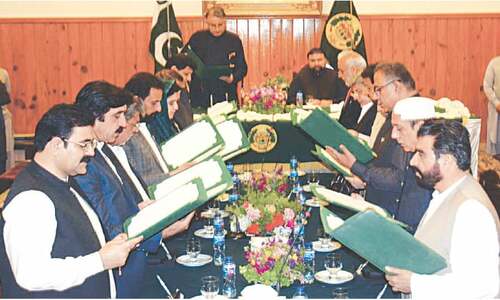Ahle Sunnat Wal Jamat (ASWJ)

Formerly known as the SSP, the ASWJ was banned 10 years after its predecessor, on February 15, 2012. They are known to spread anti-Shia sentiment across Pakistan, and often attack minority groups.
Despite the ban, the organisation remains active in spreading hatred and violence. They engage in local politics by holding rallies and gatherings, amassing a following in an attempt to legitimise the group.
Jeay Sindh Muttahida Mahaz (JSMM)

Founded in 2000 by Shafi Burfat, the JSMM is a separatist group fighting for the separation of Sindh from Pakistan. Proscribed on March 15, 2013 for alleged ties to Indian intelligence’s Research and Analysis Wing (RAW), the JSMM is thought to have been involved in sabotage through the offshoot militant faction Sindhudesh Liberation Army.
Due to lack of incidents and reported activity after being proscribed, the organisation is believed to have refocused their efforts on recruiting students for protests.
Sipah-i-Sahaba Pakistan (SSP)

Founded in September of 1985, SSP is acknowledged as one of the largest and oldest anti-Shia militant factions. They have targeted Shia mosques and leaders in the past. Having changed their name twice after they were banned for terrorist activities in January of 2002, the faction is presently known and operates as ASWJ. Along with ASWJ, SSP has the biggest presence among banned organisation on Facebook.
Baloch Student Organization Azad (BSO-A)

Founded by Allah Nazar Baloch in 2002, the organisation is known to indoctrinate the youth of Balochistan in a struggle for an independent Balochistan.
Proscribed on March 15, 2013 on the basis of spreading anti-state sentiment through strikes and processions, they remain active online and in student communities in Balochistan.
Sipah-i-Muhammad Pakistan (SMP)

Although reports vary, it is believed that Maulana Mureed Abbas Yazdani founded SMP in 1993. Formed as a Shia outfit to counter the militancy of Sipah-e-Sahaba Pakistan, their primary objective is to retaliate against aggressions from SSP and LeJ.
Proscribed on August 14, 2001 along with LeJ for suspected involvement in terrorist activities, the SMP is alleged to have carried out attacks against the leadership of banned Sunni extremist factions. Their operations were reported to have seized after a rift amidst the leadership.
Jaish-e-Muhammad (JeM)

Masood Azhar formed JeM in 2000 after being released from an Indian prison in return for hostages of an Indian Airline plane. Notorious for attacks in India-held Kashmir (IHK), the militant outfit’s stated objective is to unite IHK with Pakistan. However, it also has close links with LeJ, and its members have carried out attacks against the minority communities.
Breaking into two factions, the militant organisation is still believed to be active in the region, despite being banned on January 14, 2002 for sending non-Kashmiris into IHK causing unrest in Kashmir and hampering diplomacy between Pakistan and India. They are known for an attack on the Indian parliament in 2001, Daniel Pearl’s kidnapping and two assassination attempts on former president of Pakistan, Pervez Musharraf.
Tehreek-e-Islami

Following the refusal of Jamaat-e-Islami to shun electoral politics, Naeem Siddiqui founded Tehreek-e-Islami in 1994 with a view to start an armed struggle to turn Pakistan into an Islamic state.
Even though the outfit was banned in January of 2002, along with several other militant organisations for anti-state sentiments, it continues to operate today through its head office in Karachi.
Lashkar-e-Tayyiba (LeT)

Since its formation in 1990 by the controversial Hafiz Muhammad Saeed, LeT has been credited with carrying out several attacks on Indian soil. At the time of their conception they aided Afghanistan in their fight against the Soviets.
Infamous for the 26/11 Mumbai attacks, LeT’s interests lie in liberating held Kashmir from India and enforcing strict Salafi and Ahle-Hadith interpretations of Islam across the Indian subcontinent. Despite international attention and having been banned by the Pakistani state on January 14, 2002 for spreading terror locally and internationally, there is evidence that the outfit remains operational.
Additional research by Amar Ayaz and Illustration by Reem Khurshid
Published in Dawn, May 30th, 2017












































Dear visitor, the comments section is undergoing an overhaul and will return soon.